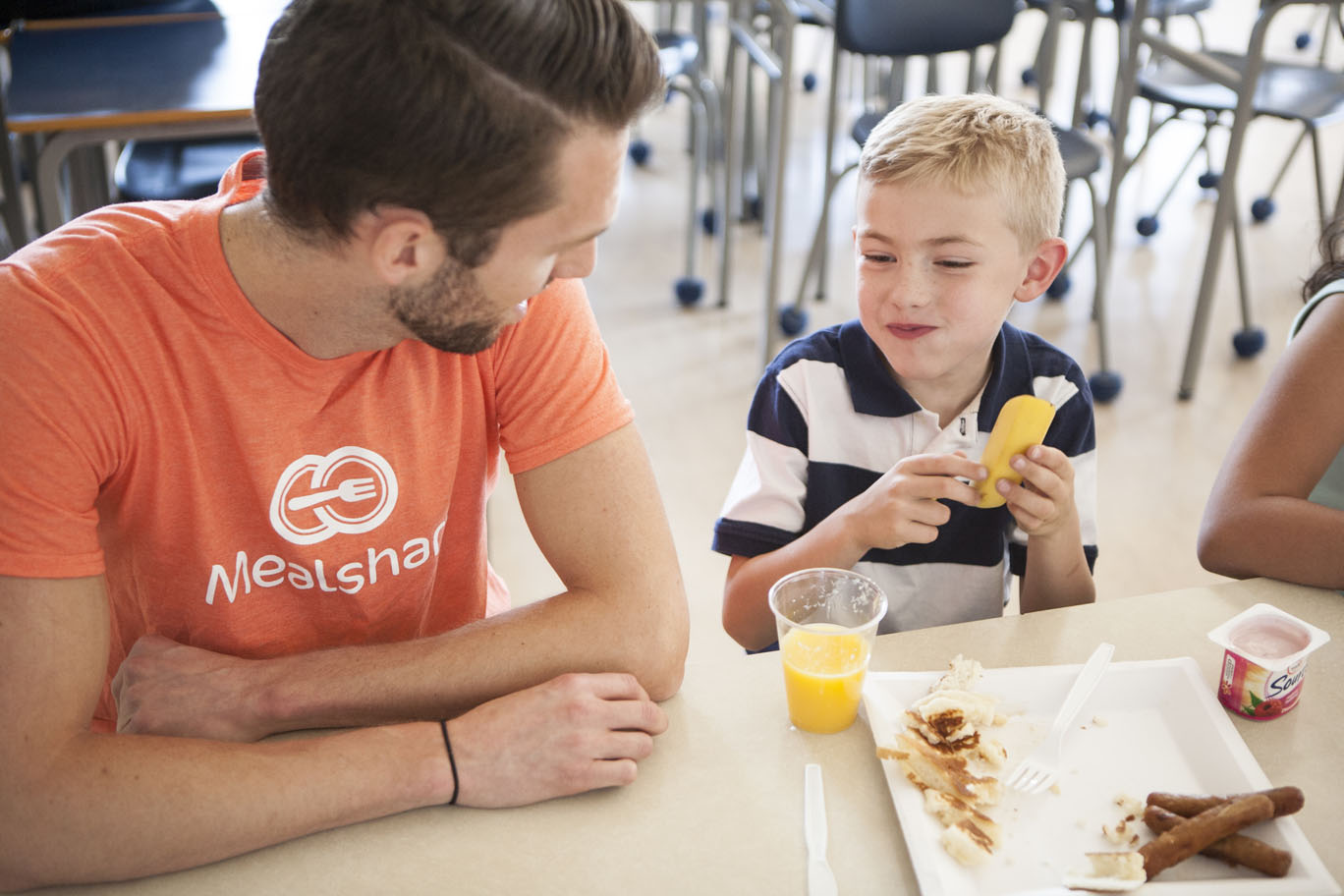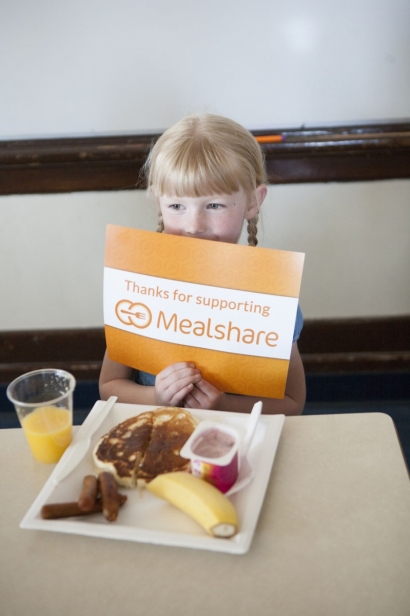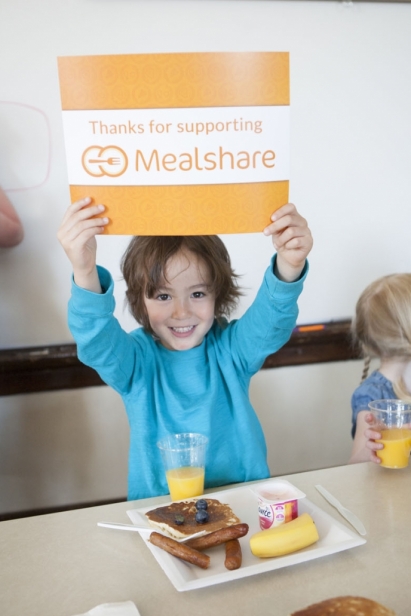Buy One, Give One
Think of it kind of like TOMS,” says Mariam Zohouri, who likes to refer to the popular brand of canvas slipon shoes, known as much for their minimalist design as their laudable business practices (and lasting appeal in hipster couture), when she talks about the company she works for. “It’s that simple — buy one; give one.”
Zohouri is a community manager for Mealshare, a rapidly growing non-profit that has discovered a simple way to tackle youth hunger by blurring the traditional BOGO (buy one, get one) marketing lines. Similar to TOMS, a shoe company that donates a pair of shoes to a child in need for every pair they sell, Mealshare is a one-for-one business model, through which restaurants donate a dollar for every meal sold.
The Mealshare concept was conceived four years ago when two cousins from Calgary, fresh off their graduation podiums and armed with business degrees, headed into the corporate fray. Jeremy Bryant and Andrew Hall settled into promising careers at multinational firms, but it wasn’t long until they felt something was missing — money, it turned out, wasn’t everything. The pair knew they could put their business acumen and desire to do good to better use.
That’s when they stumbled on a statistic: every day, eight million meals are sold across Canada while one million youths face hunger.
"People don't think about youth hunger when they think of Canada," Zohouri points out. As a communications graduate from the University of Ottawa, she also felt that something was lacking at her highly coveted high-tech job in Silicon Valley North. She soon discovered a small legion of 20- and 30-somethings across Canada bringing their entrepreneurial spirit and marketing savvy to the growing business movement of ‘buy one, give one.' “We all had something in common,” Zohouri says. “We come from business and marketing backgrounds, but we weren’t feeling fulfilled in our careers.”
And they shared something else: a desire to focus on a youth issue. “We’re all young ourselves,” Zohouri says, “And we don't want to see kids living on the line of poverty to become adults living on the line of poverty."
Bryant and Hall, stunned by the disparity of youth hunger and the culinary frenzy around them, believed there must be a way to fight hunger with hunger. They launched Mealshare in 2013, but unlike TOMS, they didn’t plan on making a product to sell. Instead, the cousins figured out a way they could stay out of the kitchen and offer social consciousness as a side dish. They first approached The Blue Star Diner, a restaurant in Calgary, and negotiated an exchange: the restaurant would list one of their meals as a Mealshare item; for every one of those meals sold, the restaurant agreed to donate one dollar to Mealshare, which would ensure that dollar went towards a meal for a youth in need.
It was a simple strategy and one with teeth — the company continued to sign on restaurants in Calgary and eventually began adding chapters across Canada, while keeping administrative costs low. Mealshare now exists in every major Canadian city (and even a few cities in the U.S.) with plans to expand across North America. To date, more than one million meals have been donated through community partners that support youth programming and meal access; and through their international partner, Save the Children, which increases access to meals at schools across the developing world. It’s a double incentive, Zohouri explains, as the meal encourages kids to come to school and gives them the stamina to participate fully in their education.
It also makes good business sense. “A meal internationally only costs about 20 cents so we’re able to stretch a dollar further for our local partners where, let’s face it, most meals cost more than a dollar,” says Zohouri, who now manages the Ottawa, Montreal and Toronto chapters of Mealshare.
While their one-for-one approach could be sloughed off as riding the conspicuous-consumption-for-good bandwagon, Mealshare goes far deeper than the TOMS trend. Instead of creating another product for an already saturated marketplace, they latch onto an existing offering, in essence acting as brokers for good. “I know this sounds cliché, but we work with organizations that are already using meals as vehicles for change,” Zohouri says.
With 30 restaurants signing on in little more than a year, Ottawa has the distinction of being Mealshare’s biggest launch to date. “It’s been absolutely crazy,” Zohouri says, “The community here is incredible.”
More than 60,000 meals have been donated to Operation Come Home and the Boys & Girls Clubs, two organizations providing healthy meals and snacks that encourage youth to participate in programs that boost their self-esteem and build positive life skills — due, in part, to the collective impact of local restaurants like The Albion Rooms, Clocktower Brewpubs and Petit Bill’s Bistro.
Participating restaurants also benefit from a team of shrewd millennials with first-rate marketing expertise fervently communicating their charitable commitment. “We look after the branding, social media and marketing materials so restaurants don’t have to,” Zohouri says. It’s an attractive selling point for food establishments that often sit squarely in the crosshairs of charities and would like to do more than just hand out a gift card.
Katherine Rainville, front of house manager and social media co-ordinator for Social, a busy restaurant in the heart of the ByWard Market, was immediately impressed with the concept. “The easiness of explaining Mealshare to our team and clientele was something that initially caught my eye,” she says, “The notion of buy one, give one is so simple.”
Mealshare options vary with Social’s seasonal menu, but Rainville says there are always two choices carrying the logo on the restaurant’s dinner and lunch menus. “We also work with Ocean Wise (a sustainable and organic fish program from the West Coast), so we've had fun pairing Mealshare and Ocean Wise together. More to get excited about and more to engage our guests.”
For Rainville, sharing the message of Mealshare is simply about giving back to its community. “It’s been a very exciting project for our staff, she says, “They have all taken an interest in Mealshare and are very eager to explain the project to our guests.”
While the momentum behind Mealshare continues to grow, there is one glitch: their ongoing success could eventually put it out of business. But while most enterprises — social, nonprofit or otherwise — are loath to admit their own redundancy, Mealshare uncharacteristically welcomes its own demise. “The hope is that one day we won’t be needed and that we will all have to find another job,” Zohouri says enthusiastically.
Securing work with a socially conscious mission is a growing trend among millennials, who seem to care less about a stable income and more about making real impacts on the world they live in. By eschewing the dog-pit tactics of business, Mealshare is leading a new paradigm where charity and commerce might finally dine at the same table — and it turns out there is plenty of food to go around.
Visit mealshare.ca for a map of participating restaurants.






